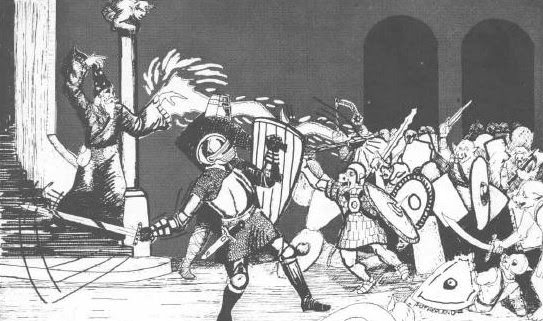SMOOSH JUICE
I Hate Combat

Here’s a confession that might get me kicked out of the old school clubhouse: I hate combat in roleplaying games.
There: I said it.
Now, I’m – obviously – not saying combat never has a place at the table. I’ve refereed sessions where battles were tense, dramatic, and even thrilling, with cunning ambushes, panicked melees in cramped spaces, last-stand battles with high stakes for all those involved. If you want, I can recount plenty of examples of fun, memorable combats from almost any campaign I’ve run in recent years (and some from well before that). However, those are the exceptions, the golden flecks in the gravel.
Most of the time, combat is the broccoli on my RPG dinner plate, something I chew through dutifully because I’m told it’s good for me. This is especially true when I’m refereeing games like Dungeons & Dragons and its descendants, which tend to highlight combat. From what I can tell, other people seem to genuinely like combat. After all, it’s in every rulebook and often takes up its longest chapter. Combat’s part of a balanced adventuring diet, isn’t it?
And yet I regularly find it tedious.
Roll to hit. Miss. Roll to hit. Miss. Roll damage. Deduct hit points. Wait. Roll to hit. Miss. Consult a chart. Roll to confirm. Miss again. Meanwhile, someone’s scrolling through social media. Combat grinds on, a clockwork of attrition that slows down the pace of the session. The usual momentum of exploration, intrigue, or even character banter gives way to a wargame that’s usually just complex enough to bog things down but not complex enough to be tactically interesting.
I know this sounds like sacrilege, especially coming from someone who inhabits the old school part of the hobby, where monsters are there to be slain and treasure to be pried from their still-warm claws. But even when I was a kid, the parts of a session I looked forward to weren’t the whittling down of hit points or the tracking of initiative. They were everything else.
I loved describing sinister rooms filled with strange objects and watching my friends debate whether or not to touch them. I loved watching them argue about the safest way for their characters to cross a rickety rope bridge across a chasm. I loved their paranoid investigations of hidden crawlspaces and their impromptu diplomacy with bullywugs they were trying to convince of their good intentions (I should write about that sometime). I loved the awkward, funny, surprisingly human interactions between characters and the worlds I’d presented to them.
That’s always been the meat of roleplaying games for me: not the fighting, but the playing. Heck, that’s why I’m still here after all these years.
To be clear: I love a good fight. In fact, as a player, I really respect a well-run tactical encounter and have nothing but praise for referees capable of this. A few years ago, for example, I played in a great Rolemaster campaign run by a friend who knew the game – and its combat rules – like the back of his hand. I left that campaign with a much greater appreciation for the unique virtues of Rolemaster and its chart-driven approach to combat. It helped, too, that the referee had a good sense of how to make combats fun, a skill in which I am decidedly lacking.
I often include combats because I feel obligated to do so. Of late, I’ve noticed this most often in my Barrett’s Raiders Twilight: 2000 campaign. Since T2K is a military RPG, it would be ridiculous not to have combats, wouldn’t it? So, we have them, even though I spend most sessions trying to figure out ways to avoid them. Again, it’s not that we haven’t had fun and exciting combats in that campaign, because I know we have. However, they’re not what interest me and I regularly feel as if combat doesn’t play to my strengths as a referee.
Consequently, I sometimes think of combat as a tax I have to pay to get to the good parts of the session, like those unskippable ads on YouTube, except the ads last half an hour and require me to reread the rules on incendiary ammunition. Again.
Now, I understand that some people love combat. For some, it’s what they most enjoy about RPGs. There’s a satisfying clarity in the geometry of battle, the crisp chain of cause and effect, the tactical puzzle. I completely understand that, because, as I said, I’ve had moments where I felt the same way. So, I salute their enthusiasm. I merely ask that they might forgive me when I can’t be bothered to remember the modifier for an attack against a prone target or how much protection a concrete wall provides against weapons fire.
For me, the real excitement comes when players sidestep combat entirely. When they parley, sneak, bribe, confuse, seduce, or otherwise avoid having to resort to swordplay or gunfire. Not only do I cheer those moments for the cleverness they demonstrate, but also because it means I don’t have to worry about my own tactical inadequacies. Plus, it’s in the unscripted non-combat interactions that the game feels most alive to me.
So, yes, I hate combat – but only because I love everything else about roleplaying games so much more.
Still, just often enough to make me question everything, a combat shines. The dice align, the stakes are high, the players are desperate, and suddenly we’re not just resolving a skirmish. We’re there, holding our collective breaths, waiting for the next roll. In those moments, I’m reminded why people put up with those incendiary ammunition rules.
But I won’t pretend I’m not secretly hoping someone talks their way out of it instead.

